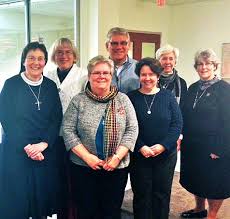Between 2012 and 2013, the National Religious Vocation Conference (NRVC) sponsored the Women Religious Moving Forward in Hope program. Generously underwritten by the GHR Foundation, these four regional gatherings brought together the vocation minister and the major superior or leadership team member of 115 canonically recognized religious institutes of women to explore the opportunities, challenges, and implications for new membership in religious life that are presented by the changing ethnic and generational demographics of Catholic women in the United States. This program also effectively fostered respectful dialogue among women religious inter-congregationally and between members of the two leadership conferences of women religious.
The final report of these gatherings identified eight critical issues for women’s religious institutes regarding new membership that need to be addressed during this transformational period of religious life:
- Establishing boundaries and clear identities as women religious
- Increasing the cultural knowledge and sensitivity of members
- Considering how communal decisions affect younger members
- Increasing the communications among leadership and vocation personnel
- Encouraging all to be inviters to religious life
- Continuing the work of reconciliation and healing within a divided Church
- Working with dioceses and parishes to promote vocations
- Trusting in God’s providence
 In response to the expressed desire of the sister participants for assistance in addressing these needs, the NRVC has prepared a resource Vocation Culture: Reflection to Action which is being made available to women’s religious institutes. The comprehensive reflective guide is intended to assist women’s congregations to better understand and evaluate their strengths and challenges around the eight critical issues identified above.
In response to the expressed desire of the sister participants for assistance in addressing these needs, the NRVC has prepared a resource Vocation Culture: Reflection to Action which is being made available to women’s religious institutes. The comprehensive reflective guide is intended to assist women’s congregations to better understand and evaluate their strengths and challenges around the eight critical issues identified above.
In this time in the Church, this is an opportunity for religious communities to hold conversations with their members in large and small groups to thoughtfully consider how their current lived experience might encourage or hinder a culture of vocations.
Entering into such meaningful dialogue will better enable religious institutes to establish vocation priorities for the next five years – and beyond. ~ Bro. Paul Bednarczyk, CSC for NRVC
